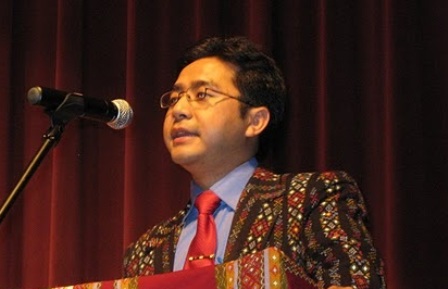Burma’s Armed Resistance Needs International Support

02 September 2011: In the ongoing struggle against the tyrannical military rule in Burma, the anti-authoritarian opposition groups have applied two methods of resistance: underground armed resistance and above-ground non-violent resistance. The shared goal of both armed and unarmed resistance is to uproot totalitarianism and restore genuine democratic reform based on federalism.
While brainstorming different strategies for democracy, peace and freedom in Burma, some might question the reasonableness and legitimacy of armed struggle to accomplish political objectives. Some might even dismiss armed resistance as a method contrary to attaining peace.
In the context of Burma, armed resistance movement is critical for peace. In the face of violent oppression by the military government, nothing can be more sacred than one’s willingness to put his or her life on the line to fight against the brutal military regime. To better phrase it, the inhumane oppression of the military government – whose heavy reliance on its armed forces to terrorize its civilians, dismantle dissident groups, and safeguard its power with violent force – has compelled leaders of otherwise peaceful pro-democratic groups to opt for armed resistance out of necessity.
As of today, all eight ethnic groups of Burma – including the dominant Burman ethnic group – have taken up arms to counter successive military governments that have been committing atrocities against innocent civilians with impunity for decades. Instead of protecting its citizens from harm as a responsible state actor, the military regime is pursuing state-sponsored terrorism against civilians. Among many, in line with its zero tolerance policy against dissidents, the military regime cruelly cracked down on peaceful demonstrators who demanded the restoration of democracy in Burma, killing thousands of innocents in 1988 and again in 2007. The regime also plotted to assassinate Daw Aung San Suu Kyi in May, 2003, while Burma’s democratic icon was on her political tour. Thankfully, their ill-advised plan failed.
Since the 1962 military coup, successive military regimes have heavily counted on the army to safeguard their power. Burma has no external threat, but has built up its army with the aim of crushing the internal threat with its military forces. Burma’s army today has become the second largest military in Southeast Asia after Vietnam. With the misleading propaganda claiming that only the Tatmadaw can protect the Union of Burma from disintegration, the army generals have consolidated their leadership.
The regime’s counter-insurgency policy has been subjecting civilians in rural areas to forced relocation, forced labour, gang-rape, physical torture, and the destruction of their livelihoods. These terrible actions against civilians have forced millions of Burmese people to flee for their lives; some of them ending up in refugee and IDP camps, while hundreds of thousands are forced into exile.
The country’s illegitimate leadership has hijacked the country at gunpoint. These generals have been trained to fire guns to kill, but not trained with diplomatic and negotiation skills essential to resolve conflict through peaceful means. With their lack of negotiation skills, coupled with lack of their genuine intention to find a negotiated solution to Burma’s conflict, they know full well that having a table war of dialogue with dissident groups would lead them to lose.
Without a genuine intention to bring about peace, one should not be surprised to see the regime’s reluctance to have a serious dialogue with the democratic opposition to find a solution to Burma’s political quagmire. Neither is it strange to witness their heavy reliance on violence, which is the only thing they are good at. Since military training is deeply ingrained in their psyche, what they understand is only military-to-military confrontation and top-down authoritarian culture with no dissenting or independent thought.
The goal of Burma’s armed resistance movement has been to free Burma from authoritarian rule and democratize. The said reality is that the collective leadership of Burma’s armed resistance movement has not received support, both financial and moral, that they badly need. With this goal in mind, peace-lovers around the world should understand the necessity of resistance and find ways to provide support to Burma’s armed dissidents. We need the leaders of the free world such as the United States, Great Britain, and France, to name a few, to formulate mechanisms that would provide assistance – financial, material and moral – to Burma’s dissident armed groups.
Humanitarian intervention, the kind of UN-mandated mission ongoing under the leadership of NATO in Libya, is intended to prevent civilians from summary executions and acts of atrocities at the hands of brutal military dictators like the Quadaffi regime. This is long overdue in Burma.
Burma’s dissident armed resistance does not need manpower, but substantial financial and moral support. That said, the onus is on leaders of Burma’s democratic opposition to make a strong and convincing case for the support of Burma’s armed resistance movement by articulating the limitations of non-violence. Despite a lack of international support for their struggle, one should reflect and be thankful that leaders of armed resistance movement still carry on despite significant obstacles.
In a time of economic uncertainty, with many competing interests for time, money and attention, the fact remains that Burma’s armed resistance movement cannot be ignored by the international community. Again and again, it is abundantly clear that the armed resistance movement remains standing as the main pillar for democratic reform in Burma. The collective actions of the armed opposition stand not only as the pillar of Burma’s democratic future, but also as the main leverage – or trump card – that democratic opposition has in negotiating with the military regime. Going forward, the Burmese people should lend their unequivocal support to strengthen Burma’s dissident armed resistance movements, and opposition leaders have to learn to work together.
Understanding the harmful effects of disunity and factionalism among them, leaders of all armed resistance must strive to eradicate any potential internal discord which not only erodes support for their struggle, but also undermines their effort to bring about genuine democratic reform in the Union of Burma.
May the armed resistance movement of Burma earn the respect they deserve and receive the support they need!
By Salai Za Ceu Lian
The author is the Commentary Editor at Chinland Guardian. He holds a Master degree in Political Science from the University of Toronto, Canada. He can be reached at [email protected]





